Three winners of the Dijkstra Prize: how did Hydra 2019 and SPTDC 2019 go

More recently, from July 8 to July 12, two significant events took place simultaneously - the Hydra conference and the SPTDC school. In this post, I would like to note several features that we noticed during the conference.
The biggest pride of Hydra and Schools is the speakers.
- Three winners of the Dijkstra Prize : Leslie Lamport, Maurice Herlihy and Michael Scott. And Maurice got it as much as two times. Leslie Lamport also received the Turing Award - the most prestigious ACM Award in Computer Science;
- Creator of the JIT Java compiler - Cliff Click;
- The developers of korutin are Roman Elizarov ( elizarov ) and Nikita Koval ( ndkoval ) for Kotlin, and Dmitry Vyukov for Go;
- Contributors to Cassandra (Alex Petrov), CosmosDB (Denis Rystsov), Yandex Database (Semen Checherinda and Vladislav Kuznetsov);
- And many other famous people: Martin Kleppmann (CRDT), Heidi Howard (Paxos), Ori Lahav (C ++ memory model), Pedro Ramalhete (wait-free data structures), Alexey Zinoviev (ML), Dmitry Bugaychenko (graph analysis).
And this is the School :
- Brown University (Maurice Herlihy),
- University of Rochester (Michael Scott),
- University of Waterloo (Trevor Brown),
- University of Nantes (Achour Mostefaoui),
- David Ben-Gurion University in the Negev (Danny Hendler),
- University of California, Los Angeles (Eli Gafni),
- Institut polytechnique de Paris (Petr Kuznetsov),
- Microsoft Research (Leslie Lamport),
- VMware Research (Ittai Abraham).
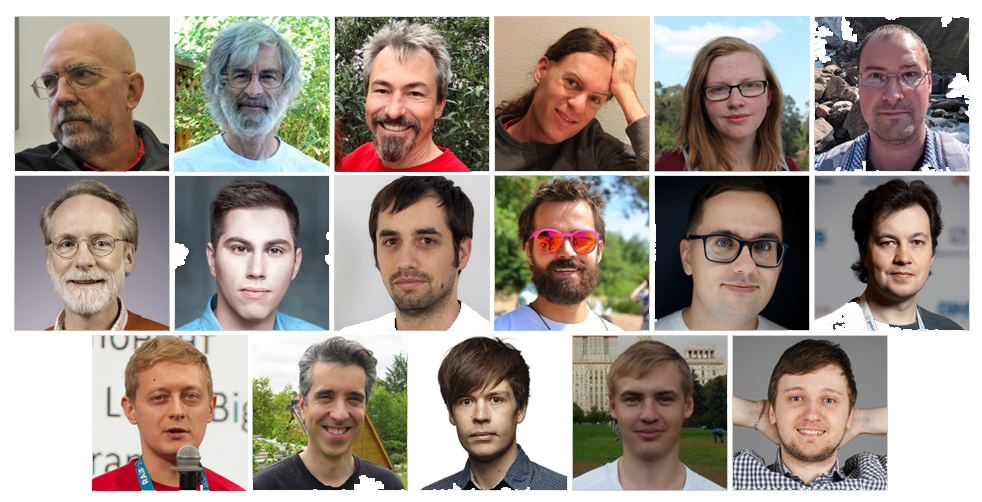
Theory and practice, science and production
Let me remind you that the SPTDC School is a small event for one and a half hundred people, world-class luminaries gather at it and talk about current issues in the field of distributed computing. Hydra is a two-day conference on distributed computing, which is held in parallel. Hydra has more engineering focus, and the School has a scientific one.
One of the goals of the Hydra conference is to combine scientific and engineering principles. On the one hand, this is achieved by selecting the reports in the program: along with Lamport, Herlihy and Scott, there are much more applied reports by Alex Petrov, who contributes to Cassandra, or Roman Elizarov from JetBrains. There is Martin Kleppman, who used to make and sell startups, and now he studies CRDT at the University of Cambridge. But the trick is that Hydra and SPTDC go side by side - they have different reports, but a common place for communication.
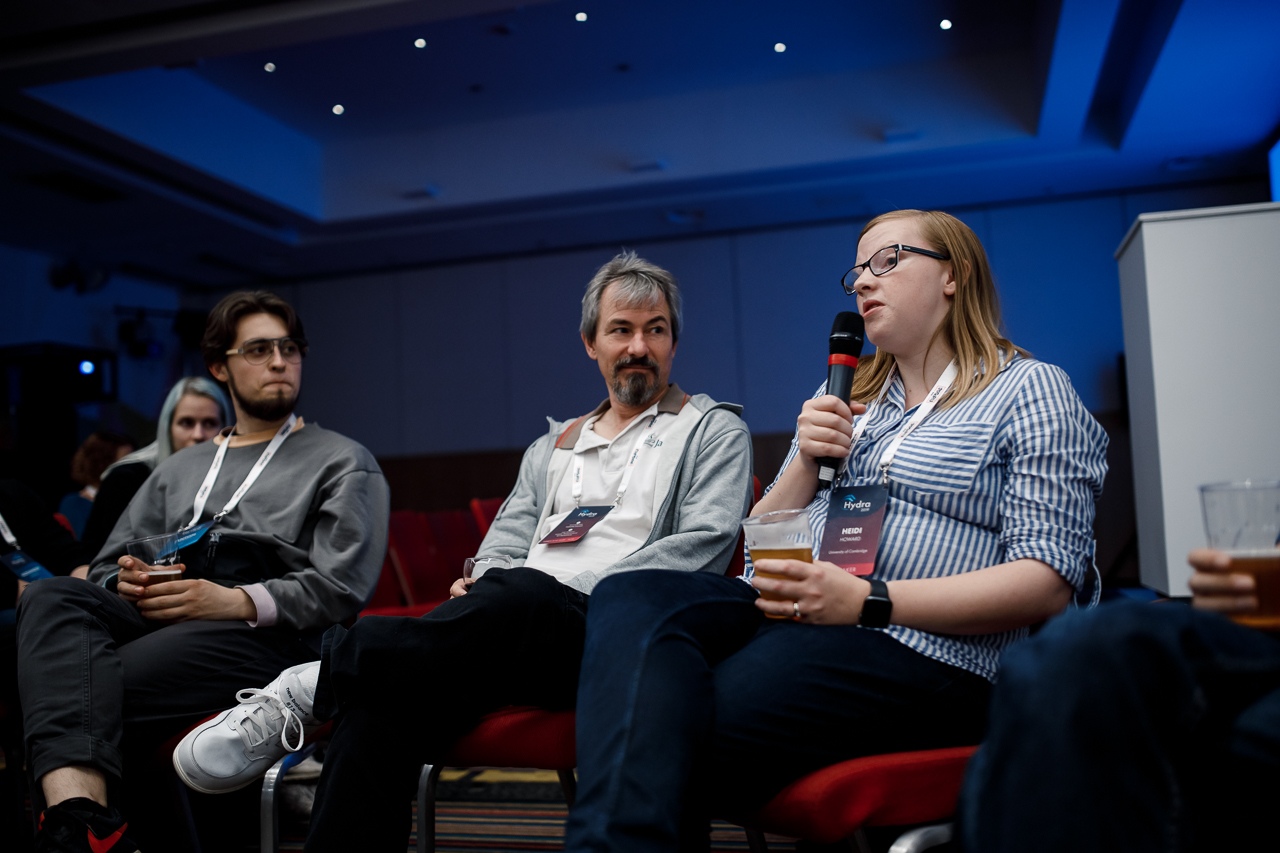
Immersion
Five days of the School in a row is a very big event and a big burden, both for the participants and for the organizers. Until the last days did not reach all. There were those who went to the Hydra and the School at the same time, and for them the last days turned out to be the most intense. All this fuss is compensated by an incredibly deep dive. It is connected not only with the volume, but also with the quality of the material. All reports and lectures at both events were not planned to be introductory, so wherever you go - you immediately dive far and deep, and you will not let go until the very end.
Of course, a lot depends on the participant’s initial training. There was a funny moment when two groups of people in the corridor independently discussed the report of Heidi Howard: one seemed completely normal, while others, on the contrary, thought hard about life. Interestingly, asserted (who wished to remain unknown) participants in program committees, Hydra’s reports and the School’s lectures at their events could be overqualified. For example, if a PHP junior came to a PHP conference to learn about life, it is a bit rash to assume that he has in-depth knowledge of the Zend Engine internals. Here, the speakers did not feed the juns with a spoon, but immediately implied a certain level of knowledge and understanding. Well, indeed, the participants who exploit distributed systems and write runtime kernels have a very high level, this is logical. Judging by the reaction of the participants, it was quite easy to pick up a report on the level and subject matter.
If we talk about specific reports, they were all good in their own way. Judging by what people say and what can be seen from the feedback form, at the School one of the coolest reports was Michael Scott's “Nonblocking data structures” , he just broke everyone, he had an anomalous rating in the 4.9 area.
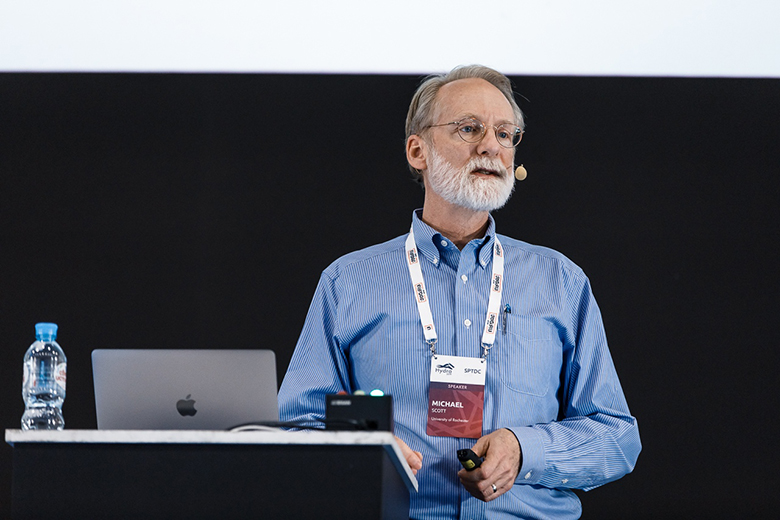
Metaconference
Long before the start of Hydra and the School, Ruslan ARG89 assumed that some kind of “metaconference” would turn out - a conference of conferences, where all the top participants of other events would automatically drag on like a black hole. So it happened! For example, among the students of the School was seen Ruslan Cheremin from DeutscheBank, a well-known specialist in multithreading.
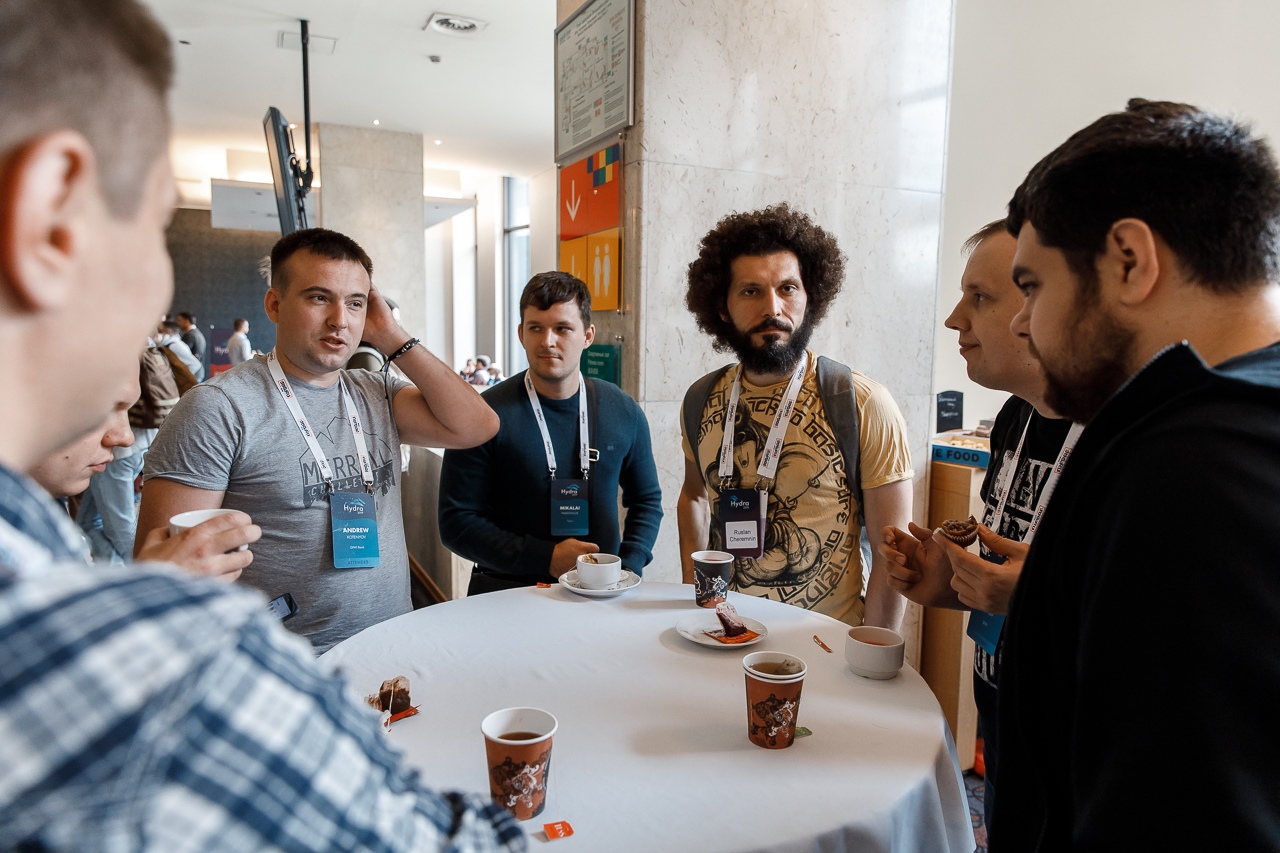
And among the participants of the Hydra, Vadim Tsesko ( incubos ) and Andrey Pangin ( apangin ) from the company Odnoklassniki were noticed. (At the same time, Vadim also helped us to make two excellent interviews with Martin Kleppman - one for Habr , and the other for viewers of the online broadcast). There were members of the DotNext program committee , well-known speakers Anatoly Kulakov and Igor Labutin. Of the javista were Dmitry Alexandrov and Vladimir Ivanov . Usually you see these people in completely different places - dotnetchikov on DotNext, javistov on Joker and so on. And here they are sitting side by side on Hydra reports and discussing bofah problems together. When this little artificial division disappears according to programming languages and technologies, the features of the subject area appear: experts on dynamic runtime communicate with other runtimers, researchers of distributed computing theory argue heatedly with other researchers, engineers of a database engine have occupied a marker board, and so on.
On the C ++ memory model report , the OpenJDK developers were at the front row (at least I know them by sight, but not pythonists, maybe pythonists were there too). In fact, there is something spiny in this report ... Ori tells us not exactly the same thing, but a close look can reveal parallels. Even after everything that happened in the latest C ++ standards, problems such as out of thin air values were not fixed, and one could go to such a report and listen to how people “on the other side of the barricades” try to fix these problems, as they argue, one could be impressed with the found approaches to the solution (Ori has one of the fixes).
There were a lot of participants in program committees and community engines. Everyone solved their interfaith problems, built bridges, overgrown with connections. I used it where I could, and, for example, we agreed with Alexander Borgardt from the Moscow C ++ User Group together to write a full-scale article about actors and asynchrony in C ++.
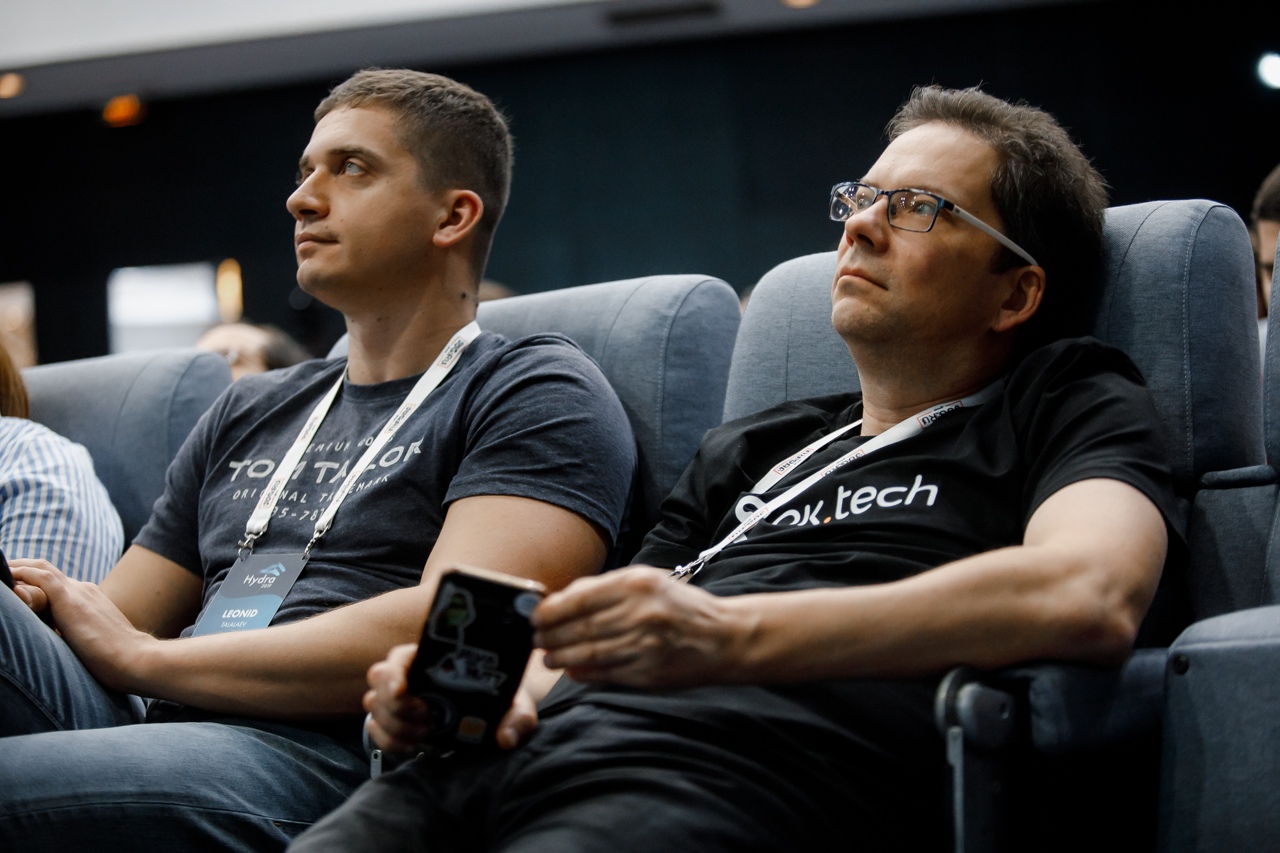
On the photo: Leonid Talalaev ( ltalal , left) and Oleg Anastasyev ( m0nstermind , right), leading developers at Odnoklassniki
Fiery discussion areas and Bafas
At conferences, there are always participants who know the subject on a par with speakers (and sometimes better than speakers — for example, when a core developer of a technology has got stuck among the participants). There were a lot of such highly expert participants on the Hydra. For example, at some point around Alex Petrov, telling about Cassandra , so many people were formed that he could not answer all. At some point, Alex smoothly pushed aside sideways and began to tear apart with questions, but the falling flag was picked up by Tyler Neely , well-known in Rust-developer circles, and perfectly balanced the load. When I asked Tyler for help with the online interview, he only asked: “When do we start?”
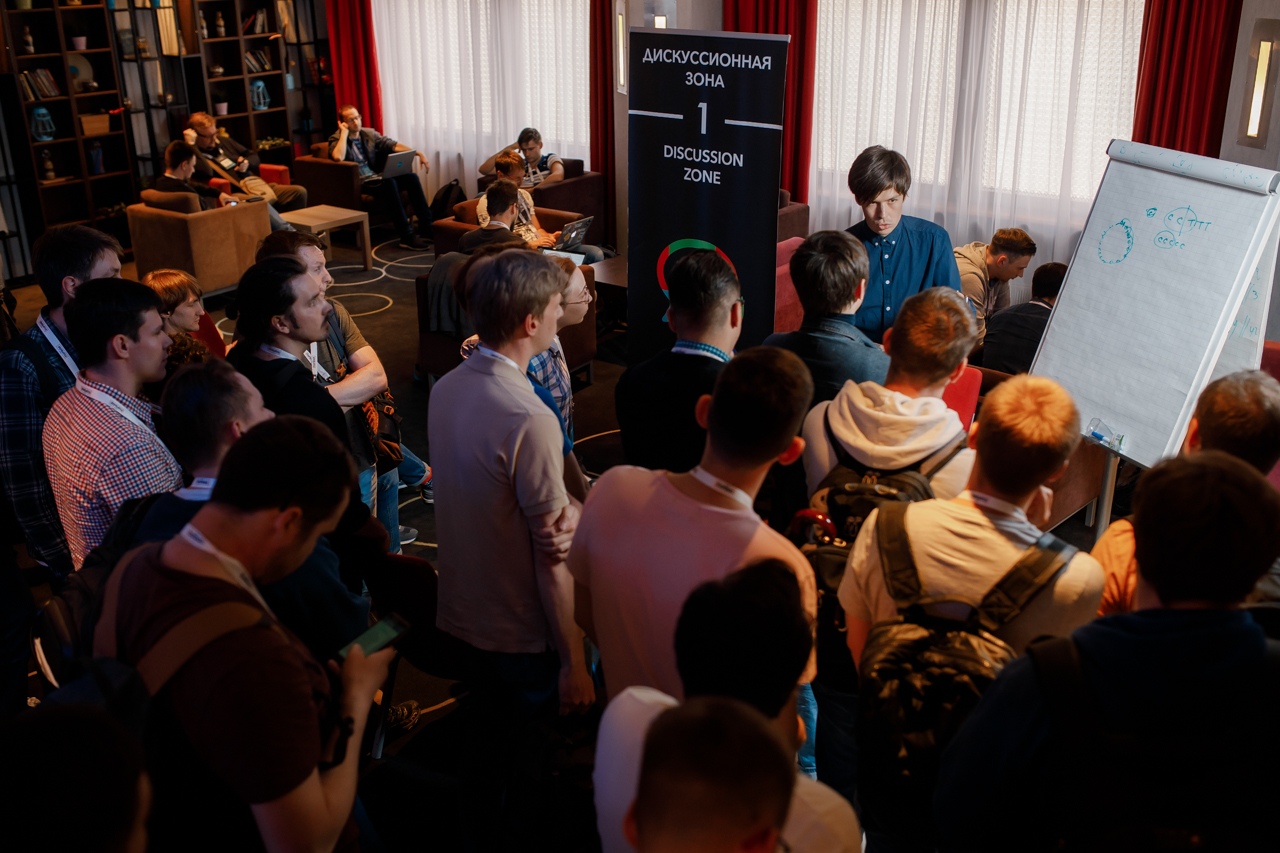
The discussion spirit sometimes broke through even into reports: Nikita Koval organized a sudden Q & A session, dividing the report into several sections.
And vice versa, on the BOF, multi-threading recalled the non-volatile memory, Pedro Ramalhete was delayed as the main specialist for this bof, and he explained everything to everyone (in short, non-volatile memory does not threaten us in the near future). One of the leaders of this bof, by the way, was Vladimir Sitnikov , who participates in the program committees of some insane number of conferences ... it seems that now it’s five pieces at a time. In the next room, about Modern CS in real world, we also discussed NVM and came to this completely independently.

I can share a super insider that even the direct participants in the story might not have noticed. Eli Gafni spoke on the evening of the first day of the School, and the next day he stayed and began to troll Lamport, and from the outside it seemed like a game and Eli was inadequate. That this is some kind of troll who set out to take out Leslie's brain. In fact, the fact is that they are almost the best friends, they have been friends for many years, and these are just such friendly jokes. That is, the joke worked - all the people around were taken to it, took it at face value.
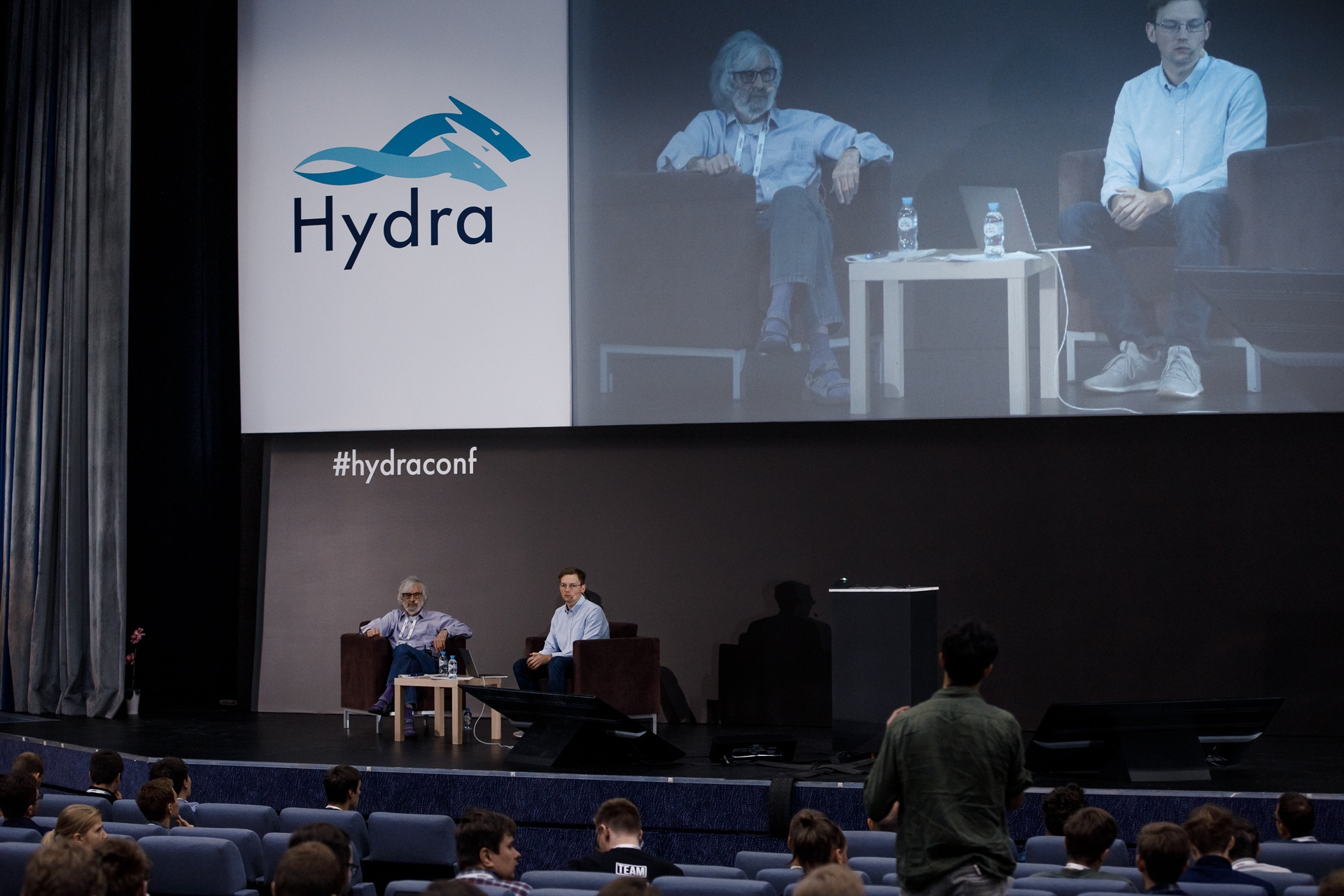
Separately, I would like to note how much love and strength the speakers put into it. Someone was in the discussion area until recently, almost for hours. The break was long over, the report began, ended, the next break began - and Dmitry Vyukov continued to answer questions. An interesting story happened to me too - taking Cliff Click off-guard, I received not only a clear and reasonable explanation of that provocative discussion about the lack of tests for certain things in H2O , but also received a full review of his new language AA . I never asked for this: I just asked what you could read about AA (it turned out you could listen to the podcast ), and instead Cliff spent half an hour to talk about the language and check that the narration was understood correctly. Amazing. It is necessary to write about AA. Another unusual experience is to observe the review process of a pull request to Kotlin. This is really a magical feeling - when you come to different discussion groups, to different speakers and dive into a completely new world. This is something like “There, There” from Radiohead .
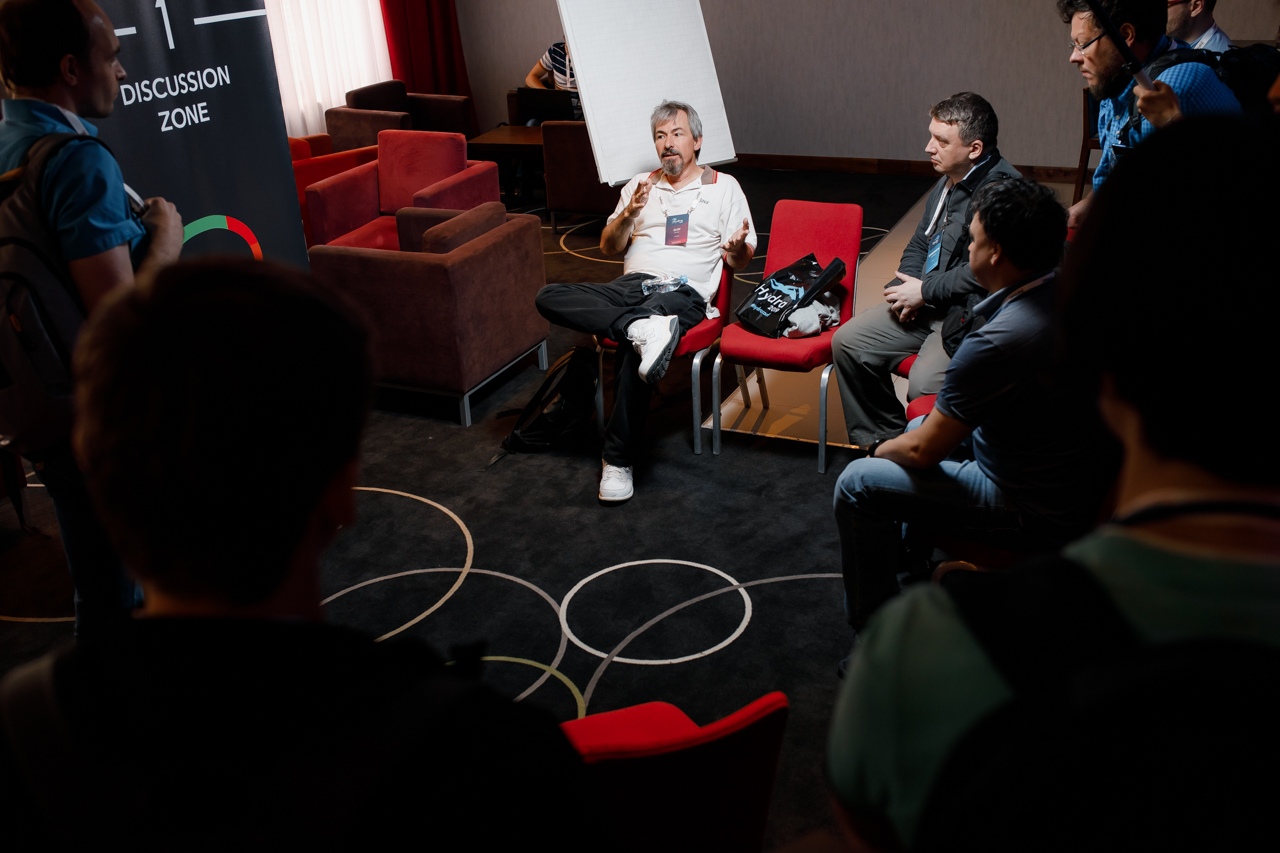
English
Hydra 2019 is our first conference, where the main language is English. It brings both its advantages and its difficulties. The obvious advantage is that people not only from Russia come to the conference, so you can meet engineers from Europe and scientists from England among the participants. Speakers bring their students. In general, important speakers have much more motivation to go to such a conference. Imagine that you are a speaker at a fully Russian-language conference: you gave your report, defended the discussion area, and then what? Ride around the city and watch tourist places? In fact, the really popular speakers have already seen enough of everything, they don’t want to go to watch the lions and drawbridges, they are bored. If all reports are in English, they can participate in the conference on a general basis, have fun, join in the discussion areas, and so on. The atmosphere is quite friendly towards the speakers.

The obvious disadvantage is that it is not convenient for everyone to communicate in English. Many understand well, but speak poorly. In general, the usual things that were solved in different ways. For example, some discussion zones began in Russian, but instantly switched to English when the first English-speaking participant appeared.
I myself had to make opening and closing inclusions of the online broadcast exclusively in English and participate in a pair of interviews with experts under the recording. And it was for me a real challenge, which will not be soon forgotten. At some point, Oleg Anastasyev ( m0nstermind ) simply said that I would stay with them at the interview, and I understood too slowly what that meant.
On the other hand, it is very nice that the people on the reports asked questions with a bang. Not only native speakers, but everything, it worked well. At other conferences, it is often clear that people are embarrassed to ask questions from the floor in broken English, and can squeeze something out of themselves only in the discussion area. It was completely wrong. Relatively speaking, some Cliff Click finished the reports a little earlier, and after that the questions went on in a continuous series, the conversation turned into a discussion area - without awkward pauses and breaks. The same applies to the Q & A session of Leslie Lamport, the moderator almost did not have to ask his questions, the participants came up with everything.
There were all sorts of little things that few people notice, and they are. Due to the fact that the conference is English-speaking, the design of such things as leaflets and maps is easier and more concise. No need to duplicate languages and clutter up the design.
Sponsors and Exhibition
Our sponsors greatly helped in creating the conference. Thanks to him, there was always something to do during the breaks.
At the Deutsche Bank TechCenter stand, it was possible to talk with the engineers of multithreaded systems, solve their problems “from the head”, win memorable prizes and just have a good time.

At the Kontur stand , it was possible to talk about their own systems, both open and open source: a distributed in-memory database, a distributed binary log, a microservice orchestration system, a universal transport for telemetry, and so on. And of course, puzzles and contests, stickers with a binary cat and the Suffering Middle Ages, gifts like Martin Kleppmann’s book and LEGO figures.
Pay attention that analysis of tasks of the Contour is already published on Habré . Parsing good, worth a look.

Those interested could purchase all sorts of books, discuss them with colleagues. A whole crowd has gathered at the autograph session!
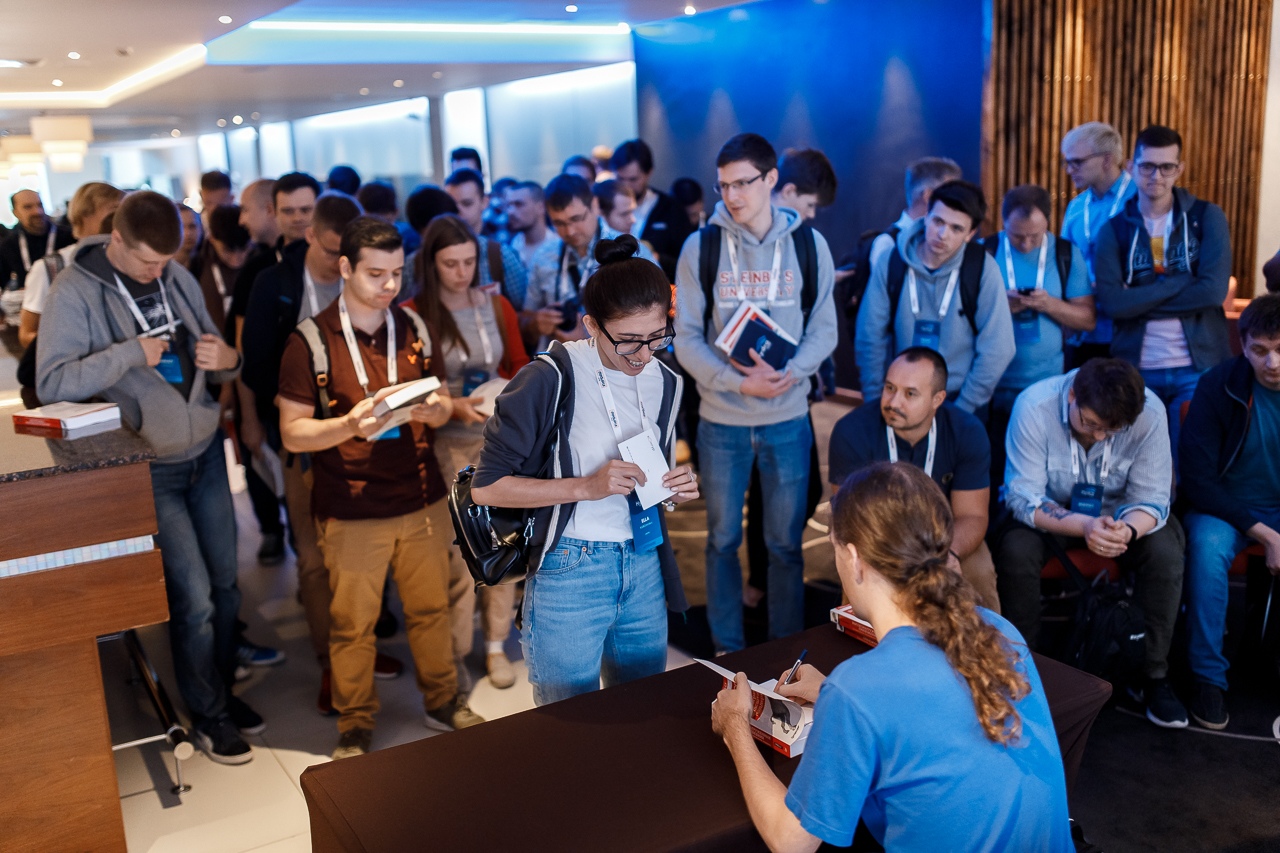
Results
The Hydra Conference and SPTDC School are very important events for us as the organizing company and for the whole community. This is a chance to look into our future, to develop a single conceptual apparatus for discussing contemporary problems, to look at interesting directions. Multi-threading appeared a long time ago, but after the appearance of the first truly multi-core processor, it took a whole decade for the phenomenon to become widespread. What we heard this week on the reports is not passing news, but a road to a bright future, which we will follow in the coming years. In this post there will be no spoilers for the next Hydra, but you can hope for the best. If you are interested in such problems, it may be worth paying attention to our other events, such as hardcore reports at Joker 2019 or DotNext 2019 Moscow conferences. See you at the next conferences!
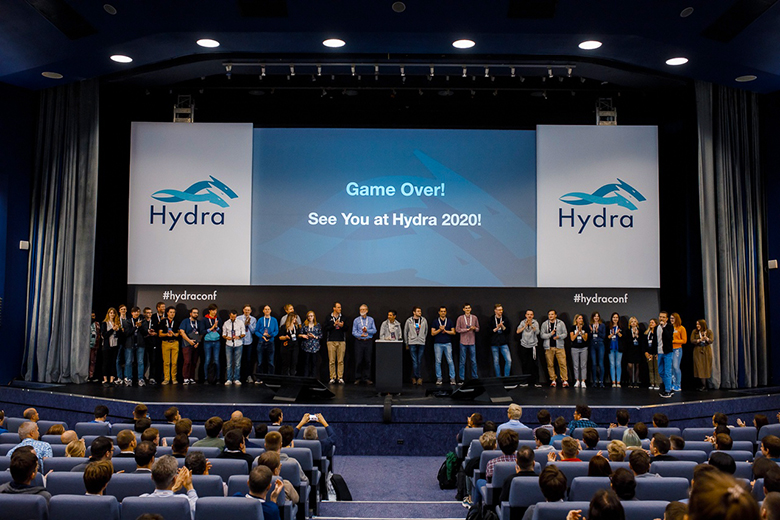
')
Source: https://habr.com/ru/post/460499/
All Articles